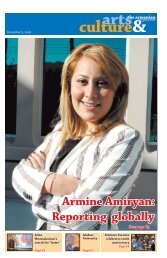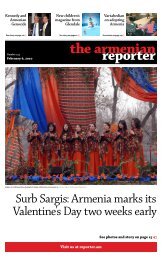Eastern U.S. edition - Armenian Reporter
Eastern U.S. edition - Armenian Reporter
Eastern U.S. edition - Armenian Reporter
You also want an ePaper? Increase the reach of your titles
YUMPU automatically turns print PDFs into web optimized ePapers that Google loves.
6 The <strong>Armenian</strong> <strong>Reporter</strong> | July 18, 2009<br />
Community<br />
U.S. ambassador discusses the status of women in Armenia<br />
aiwa and alma<br />
sponsor gathering<br />
WATERTOWN, Mass. – The<br />
current economic downturn in Armenia<br />
has had an especially adverse<br />
effect on the position of women,<br />
according to Marie Yovanovitch,<br />
the U.S. ambassador.<br />
Speaking last month at a breakfast<br />
in Watertown co-sponsored by<br />
the <strong>Armenian</strong> International Women’s<br />
Association and the <strong>Armenian</strong><br />
Library and Museum of America,<br />
Ms. Yovanovitch acknowledged<br />
that statistics are imprecise, but<br />
had no doubt that “women are especially<br />
hard hit by unemployment<br />
in Armenia.” Women are more likely<br />
than men to lose their jobs, and<br />
it is more difficult for them to find<br />
new positions, she said. This situation<br />
has serious consequences for<br />
families, the ambassador observed.<br />
In some areas affecting women,<br />
however, Armenia has made impressive<br />
progress, Ms. Yovanovitch<br />
pointed out. Over the past eight to<br />
nine months, the government has<br />
taken a strong stand against trafficking<br />
in women. There have been<br />
a number of prosecutions, and<br />
penalties for those convicted have<br />
been stiff.<br />
As a result, in a report just released<br />
by Secretary of State Hillary<br />
Clinton, Armenia has been<br />
removed from the Tier Two Watch<br />
List in trafficking. She credited<br />
Deputy Prime Minister Armen<br />
Gevorgyan with taking the lead<br />
on this issue. “Even in these difficult<br />
times, the <strong>Armenian</strong> government<br />
has put money into this effort,”<br />
she said.<br />
Asked about charges of undue<br />
influence in Armenia’s society by<br />
hidden “mafia” elements or financial<br />
magnates, Ms. Yovanovitch<br />
said that this was a matter to be<br />
considered. The people convicted<br />
in trafficking cases were all women,<br />
although one might suspect that<br />
there were men operating behind<br />
these women, she said.<br />
In a more general sense, “the lack<br />
of transparency in government<br />
and in society is a serious concern,”<br />
the ambassador stated. “People in<br />
Armenia (and in the United States)<br />
pay a big price for this.” The ambassador<br />
went on to applaud the<br />
<strong>Armenian</strong> government for progress<br />
in some areas, for example the recent<br />
action to grant a general amnesty<br />
that made special provisions<br />
for those prosecuted in connection<br />
with the bloody clashes of March<br />
1, 2008.<br />
Regarding the status of women<br />
in general, Ms. Yovanovitch granted,<br />
“we could be doing a lot more<br />
on gender issues.”<br />
She has met a large number of<br />
“remarkable women,” in Armenia,<br />
the ambassador noted. The U.S.<br />
Embassy is embarking on a mentoring<br />
program to pair some of these<br />
women with young students at the<br />
American University of Armenia.<br />
Asked about prospects for one of<br />
aiwa’s initiatives in Armenia, the<br />
Women’s Entrepreneurship Project,<br />
the ambassador acknowledged that<br />
opportunities for <strong>Armenian</strong> women<br />
in the fields of business and finance<br />
are limited. It is very difficult to obtain<br />
a loan in Armenia, she noted.<br />
The United States formerly had programs<br />
in this field, but “perhaps we<br />
might have departed too soon.”<br />
Several other topics of interest,<br />
especially regarding relations<br />
between the United States and<br />
Armenia, were covered informally<br />
during the breakfast, which was<br />
the first event in Ms. Yovanovitch’s<br />
tour of <strong>Armenian</strong> communities in<br />
the United States. aiwa founder<br />
and former president Barbara<br />
Merguerian introduced the ambassador,<br />
and alma chairperson<br />
Haig Der Manuelian offered welcoming<br />
remarks. James Kalustian<br />
was coordinator of the Boston<br />
visit.<br />
<br />
Berdj Svajian lectures at agbu Montreal Chapter on the<br />
centennial of the Adana massacres<br />
At Breakfast with<br />
U.S. ambassador<br />
to Armenia Marie<br />
Yovanovitch,<br />
seated, from<br />
right, aiwa<br />
founder Barbara<br />
Merguerian, Ms.<br />
Yovanovitch,<br />
alma<br />
chairperson<br />
Haig Der<br />
Manuelian, and<br />
visit coordinator<br />
James Kalustian.<br />
At breakfast with U.S. ambassador to Armenia Marie Yovanovitch, co-sponsored by alma and aiwa, from left, aiwa Vice<br />
President Joy Renjilian-Burgy, aiwa scholarship recipient Sarah Varadian (Stonehill College), Ms. Yovanovitch, and aiwa<br />
founder Barbara Merguerian.<br />
A view of the audience that attended the April 29th Adana lecture by Berdj Svajian at the agbu Montreal Center.<br />
MONTREAL – On April 29, Berdj<br />
Svajian delivered a lecture about<br />
the Adana Massacres to an audience<br />
of over 100 people at the agbu<br />
Demirdjian Hall in Montreal. The<br />
event was organized by the agbu<br />
Montreal Cultural Committee and<br />
the Manuel Keoseyan <strong>Armenian</strong><br />
Studies Course on the centennial<br />
of this historic event and included<br />
a presentation of documentary evidence<br />
and 200 slides.<br />
The lecturer was introduced<br />
by Shahe Tanashian, director<br />
of the Manuel Keoseyan <strong>Armenian</strong><br />
Studies Course. Mr. Svajian<br />
began his presentation by dedicating<br />
the event to the memory<br />
of his grandparents, who were<br />
forced to leave their native Adana<br />
during the massacres of 1909.<br />
Starting with general information<br />
about the geography and<br />
history of the city, he included a<br />
detailed description of local customs<br />
and practices that defined<br />
the place.<br />
He projected slides depicting the<br />
massacre, torture of intellectuals,<br />
destruction of churches, and transformation<br />
of schools into stables.<br />
The first massacre took place on<br />
April 1, 1909, and was followed by<br />
a second, and even more horrible<br />
event, which aimed to eliminate<br />
the whole <strong>Armenian</strong> population.<br />
Mr. Svajian’s slides also included<br />
scenes of the Ayn Toura orphanage<br />
in Lebanon, which had been established<br />
to house and Turkify <strong>Armenian</strong><br />
orphans and was under the<br />
supervision of Halide Edib Hanim<br />
and Jemal Pasha, who later served<br />
as the Turkish marine minister.<br />
The final slides showed the documents<br />
and photos of the signed<br />
property deeds belonging to Mr.<br />
Svajian’s grandparents, which were<br />
rescued from the 1909 massacre. At<br />
the end of the program, Mr. Svajian<br />
invited Garbis Dekmezian,<br />
an Adana native, to light candles in<br />
memory of the victims of 1909.<br />
Words of appreciation and<br />
thanks were spoken by Arsine Attarian,<br />
chair of agbu Montreal’s<br />
Cultural Committee, and Arshavir<br />
Gundjian, agbu vice president<br />
and founding president of the Alex<br />
Manoogian School.<br />
The program came to a close with<br />
a prayer by Rev. Mher Khachigian<br />
and the blessings of Bishop Bagrat<br />
Galstian, Primate of the Diocese<br />
of Canada.

















